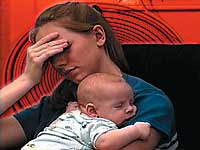
Source: The Nemours Foundation
One of the toughest decisions that a lot of teens face is whether to have sex. Teens who decide to become sexually active must also take responsibility to stay protected from unplanned pregnancy and sexually transmitted diseases (STDs).
In the United States, the teenage pregnancy rate is higher than in many other countries. Approximately 1 million teen girls become pregnant every year and most of them don't intend to. In addition to preventing unplanned pregnancies, sexually active teens must protect themselves from STDs — which means that condoms must be used every time.
The most effective method of birth control is abstinence, which means no sexual intercourse. Abstinence is the only way that couples can be 100% sure they will not have to deal with pregnancy or STDs.
The American Academy of Pediatrics (AAP) has said that sex education that includes information about abstinence and birth control is the most effective way to keep down the rate of teen pregnancy.
As a parent, you play a key role in this education. It's important that your kids feel, from a young age, that they can come to you with a question about sexuality, no matter what it is. It helps if you treat sexuality as a natural part of development, not something dirty or embarrassing.
Providing the facts is vital, but it's also wise to give your kids a sense of where you stand. Teens, especially, may seem uninterested in your views on sex and birth control, or even your values in general, but they usually take in more than you think.
At times, kids may not feel comfortable approaching parents with questions about sexuality. That's OK. But it's important that they have a trusted adult — like a teacher, school counselor, school nurse, or doctor — to talk with about birth control and other issues related to sex.
Birth Control Methods
Couples who do choose to have sex have many effective birth control methods to choose from. Check out the articles below to learn important facts about these different options. You may be surprised — some popular ones aren't as effective as many people think:
Abstinence
Birth control patch
Birth control pill
Birth control ring
Birth control shot
Cervical cap
Condoms
Diaphragm
Emergency contraception (morning-after pill)
IUD
Rhythm method
Spermicide
Withdrawal
Reviewed by: Larissa Hirsch, MDDate reviewed: January 2007
Note: All information is for educational purposes only. For specific medical advice, diagnoses, and treatment, consult your doctor.







